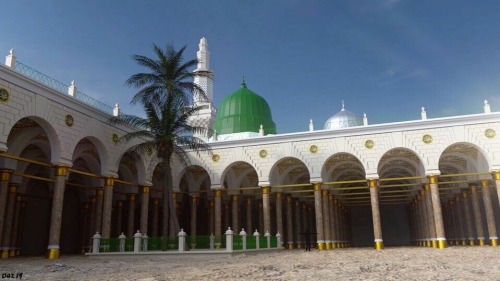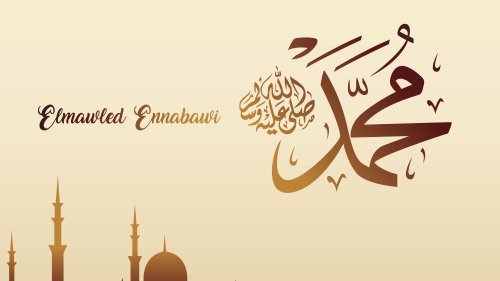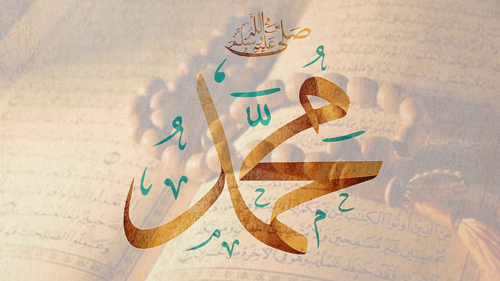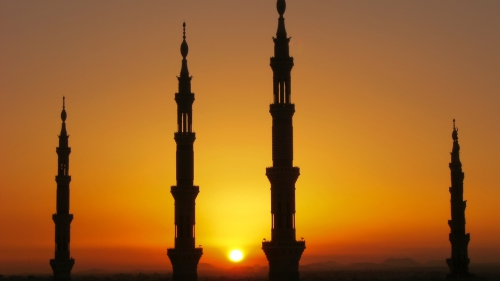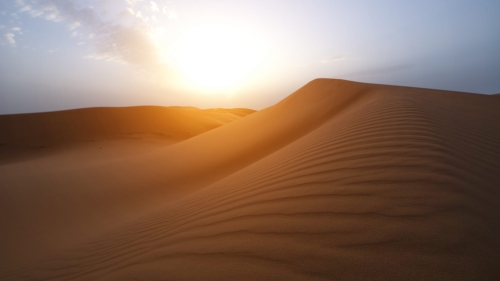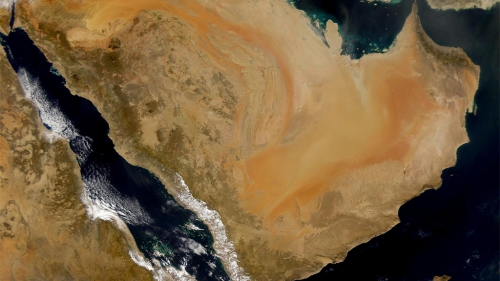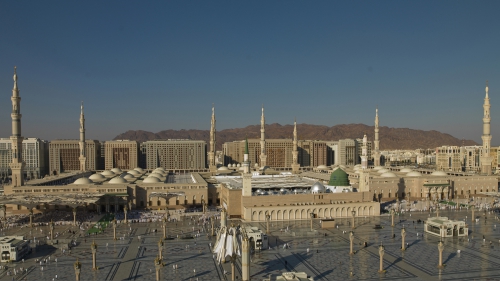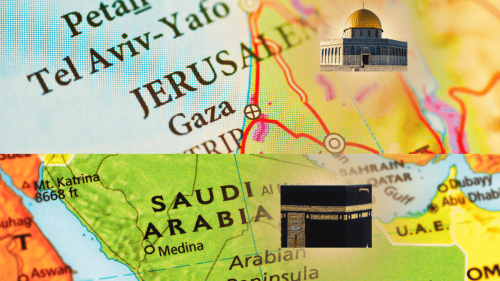La Hijrah Ba'd al-Fath (No Migration after the Conquest): Implications for the Development of Madinah

In the wake of the conquest of Makkah, in the eighth year after the Hijrah, most of the Arabian Peninsula communities wittingly entered the fold of Islam. Those who declined to do so - covertly or otherwise - peacefully accepted the rule of Islam and the Muslims. It was around this time that the Prophet (pbuh) proclaimed that there is no Hijrah (migration) to Madinah after the take-over of Makkah; there remained only jihad and niyyah (intending good in all actions) afterwards. The Prophet (pbuh) used to encourage people from then on to stay where they were, and to contribute whatever they could in implementing and disseminating the Word of God elsewhere, since "To Allah belongeth all that is in the heavens and on earth... " (al-Baqarah 284), and "To Allah belong the East and the West: whithersoever ye turn, there is Allah's Face. For Allah is All-Embracing, All-Knowing" (al-Baqarah 115).
At first, owing to the conditions which the Muslims and Islam were living through in Makkah, performing the Hijrah was imposed as an individual duty, particularly after the successful formation of the Muslim community in Madinah had come to pass. Undertaking the Hijrah was incumbent on each person because of the dangers the Muslims were exposing themselves to in Makkah and elsewhere. Such dangers, some of which were life threatening, incapacitated the followers of Islam from living peacefully and practicing under normal circumstances their new religion. Also, the Hijrah was an individual duty because the young community in Madinah was in dire need of abundant human resources with diversified capabilities and talents. The city-state of Madinah needed to evolve swiftly into a strong, thriving and respectable community capable of defending itself and its ideals.
According to some scholars, because it was the home of the Hijrah, Madinah was declared a Haram (sanctuary) so that its rich and delightful natural environment could be preserved and kept intact. In turn, the people were expected to be lured to migrate and settle therein. Urging the people to take the trouble to migrate to Madinah, Allah says in the Qur'an: "Those who believed, and migrated and fought for the Faith, with their property and their persons, in the cause of Allah, as well as those who gave (them) asylum and aid -, these are (all) friends and protectors, one of another. As to those who believed but did not emigrate ye owe no duty of protection to them until they emigrate; but if they seek your aid in religion, it is your duty to help them, except against a people with whom ye have a treaty of mutual alliance. And (remember) Allah seeth all that ye do" (al-Anfal 72).
Allah also says: "When angels take the souls of those who die in sin against their souls, they say: 'In what (plight) were ye?' They reply: 'Weak and oppressed were we in the earth.' They say: 'Was not the earth of Allah spacious enough for you to move yourselves away (from evil)?' Such men will find their abode in Hell. - What an evil Refuge! - Except those who are (really) weak and oppressed - men, women, and children who have no means in their power, nor can they find a way (to escape), for these, there is hope that Allah will forgive: for Allah doth blot out (sins) and forgive again and again. He who forsakes his home in the cause of Allah, finds in the earth many a refuge, and abundance should he die as a refugee from home for Allah and His Messenger, his reward becomes due and sure with Allah: and Allah is Oft-forgiving Most Merciful" (al-Nisa' 97-100).
The Prophet (pbuh) also encouraged the people to migrate to and remain in Madinah by numerous sayings and actions of his. The Prophet's language in this respect varied: he would sometimes single out the positive sides of the city, and at other times, he would try to lessen and, if possible, eliminate totally the damaging impact of the city's disadvantageous aspects on the migrants' easy and stress-free acclimatization and settling down. For instance, shortly after his arrival in Madinah, when some of the Migrants were down with unbearable fever, the Prophet (pbuh) prayed: "O Allah, make Madinah as congenial and dear to us as You made Makkah congenial and dear, or more than that. Make it conducive to health, and bless us in its sa' and its mudd (sustenance), and transfer its fever as far as al-Juhfa."
The Prophet (pbuh) also prayed: "O Allah, increase in Madinah twice the blessings (You showered) on Makkah.""
He said: "For one who shows endurance on the hardships and rigor of it (Madinah) I would be an intercessor or a witness on his behalf on the Day of Resurrection."
Also: "He who intends to do harm to the people of this city (Madinah) Allah would efface him as salt is dissolved in water,"
"There are angels guarding the entrances (roads) of Madinah, neither plague nor Dajjal (the Impostor, Antichrist) will be able to enter it."
When appointing anyone as the leader of an army or detachment, the Prophet (pbuh) would exhort him to adhere to the Islamic ethics concerning everything that he and the soldiers might have to come into contact with, such as spoils distribution, the treatment of enemy's dead bodies, the treatment of the children and women of enemies, the treatment of prisoners, and the like. The Prophet (pbuh) would insist that enemies firstly be invited to accept Islam. If they did so, they would then be invited to migrate from their lands to the land of the Migrants (Madinah), if they wanted to have all the privileges and obligations of the Migrants. However, if they refused to migrate, they would then have the status of Bedouin Muslims, that is to say, they would be subjected to the commands of Allah like other Muslims without receiving any share from the spoils of war or land tax (fay'), except if they actually fought along with the other Muslims.
This Madinah sentiment was in sharp contrast with what was transpiring in Makkah prior to the Hijrah, when the Prophet (pbuh) and those who followed him felt insecure and uncertain about almost anything that the upcoming days had in store for them. During such times, it was as good as impossible to have any elaborate long-term plans as to the future of the community which was short of liberty, land, sovereignty and security. It has been reported that during an early phase of this precarious period, a man called Abu Dharr - later, one of the prominent companions - arrived all the way from his tribe Banu Ghifar, lying on the Hijaz trading route to Syria, to meet the Prophet (pbuh) and embrace Islam. Having accomplished what he had come for, and having been beaten on two occasions in two consecutive days by the Quraysh in the process because he cried out aloud declaring his Islam in close proximity to the Ka'bah where the Quraysh noblemen were assembled, Abu Dharr was then asked by the Prophet (pbuh) to go back to his people and invite them to Islam until his new command reached him. Eventually, Abu Dharr not only converted his tribe Banu Ghifar to Islam, but also the tribe of Banu Aslim in their own country.
However, after the conquest of Makkah, when whole tribes and tracts of countryside embarked on accepting Islam collectively, pledging the Prophet (pbuh) their loyalty and devotion, the duty of migration to Madinah was annulled. Nevertheless, the same duty was still binding - and shall always do - in places where the Muslims lived as a minority and were experiencing trials and tribulations of the kind experienced by the first Muslims in Makkah. Not only to Madinah could they in such cases migrate, but also to any part of the lands controlled by the Muslims.
Bringing the Hijrah to Madinah to a close had several implications for the future of the city. Three are most significant:
Firstly:
It precluded undesired crowding in the city. The Prophet's move was timely indeed, taking into account the dramatic conquest of Makkah and the number of people who accepted Islam thereafter. There are several accounts in which some people are reported to have come to Madinah on the pretext of accomplishing the Hijrah, but were told by the Prophet (pbuh) to return where they had come from. They were told that the Hijrah to Madinah was no longer considered necessary. Nonetheless, there remained an undying all-out struggle for the supremacy of the Islamic cause (jihad), which entailed as much dedication and sacrifice, and so reward, as the act of Hijrah itself.
That the Prophet (pbuh) was really concerned about the subject of unsolicited crowding in Madinah, in general, and in certain places at the expense of the others within it, in particular, testifies the fact that the people of the Bani Salamah clan, who were staying near the Sal' hill about one mile from the Prophet's mosque, wanted to shift to a place near the Prophet (pbuh) and his mosque, but the Prophet (pbuh) did not favor the idea saying: "O Banu Salamah! Don't you think that for every step of yours (that you take towards the mosque for prayers) there is a reward?" Commentators of the Qur'an assert that this occurrence was behind the revelation of the following verse in the Ya Sin chapter (the whole chapter Ya Sin was revealed in Makkah, with the exception of this verse which was revealed in Madinah): "Verily We shall give life to the dead, and We record that which they send before and that which they leave behind, and of all things have We taken account in a clear Book (of evidence)" (Ya Sin 12). The companion Abdullah b. 'Abbas said that it was not only the clan of Banu Salamah that wanted to move closer to the Prophet's mosque, but also many more families and clans of the Helpers. However, following the revelation of the said verse, they all gave up their plans.
Secondly:
After the Hijrah of the Prophet (pbuh), the Muslims from outside Madinah set out to throng the newly established city-state from wherever they had embraced Islam, but chiefly from Makkah. Initially, they all stayed together with the citizens of Madinah, shared with them, as well as amongst themselves, whatever they could procure, until the new houses were built and some new employment opportunities were created for them. In order to help the non-Madinah citizens settle down fast, the Prophet (pbuh) legislated the system of brotherly association (mu'akhah) among the Migrants and Helpers. The mu'akhah included 90 men, 45 from either side. Before long, the projected integration of the Helpers and Migrants was set to be consolidated further after the mixed marriages started to take place. Of the first Migrants who got married from the ranks of the Helpers were Abu Bakr, 'Umar b. al-Khattab and 'Abd al-Rahman b. 'Awf. Consequently, the number of the Madinah citizens grew very fast. The increase was several times the original population size. Following the expulsion of the Jews, who numbered between 6000 and 7000 and whose estates and houses the incoming Muslims occupied, the overall population growth, for a short term, was brought to a halt. However, it was not so long before it started increasing again. According to an estimation, the size of the Madinah populace at the time of the Prophet's death was about 30000. Some researchers also estimated that in the sixth year subsequent to the Hijrah, the houses of Madinah numbered approximately 800, and by the tenth year the number must have climbed the figure of between 2000 and 2500.
Obviously, due to this sharp population increase in Madinah, the Prophet's mosque, a community development center, had to be enlarged after the conquest of Khaybar in the seventh year. However, before long the mosque appeared again to be too small to accommodate comfortably the ever-increasing number of worshippers, especially on Fridays during the Jumu'ah prayer. An unmistakable hint at this is found in a proclamation of the second caliph Umar b. al-Khattab, who several years after the Prophet's death enlarged significantly the mosque. Umar said that if he had not heard the Prophet (pbuh) saying - perhaps shortly before he had passed away - that the mosque should be enlarged (yet again) he, in all probability, would have refrained from doing anything to it.
This only goes to prove that the number of the Migrants in Madinah was constantly increasing, whereas the number of the Helpers remained virtually static. The ratio of the Helpers vis--vis the rest was steadily becoming in favor of the latter. How the Madinah demography was fast changing against the interests of the Helpers could be seen from the statistics on the number of Muslim warriors in the battle of Badr, which occurred eleven months after the Hijrah. The number of the fighters from the Migrants was only over sixty, whereas the number of the Helpers was over 249. Apart from the battle of Uhud, about one year later, this kind of disparity, whereby the Helpers greatly outnumbered the Migrants, was not to recur in any forthcoming military expedition.
The Prophet (pbuh) was very much concerned about this emerging phenomenon and its potential repercussions, doing his best to safeguard the identity, interests, role and standing of the Helpers. The Prophet's words that the Hijrah to Madinah, following the conquest of Makkah, was no longer binding, could be viewed as one of the strategies adopted for protecting the Helpers. One day during the illness from which he never recovered, the Prophet (pbuh) came out from his house to the mosque where he sat on the minbar and addressed the people with these words: "The people will go on increasing, but the Helpers will go on decreasing till they become just like salt in a meal. So, whoever amongst you will be the ruler and have the power to harm or benefit others, should accept the good of the good-doers amongst them (the Helpers) and excuse the wrong-doers amongst them (the Helpers)."
Surely, the Prophet (pbuh) could not forget what the Helpers had done for his own sake, for the sake of Islam, and for the sake of their brethren from Makkah. He one day remarked that the Helpers were those with whom he finally found a safe haven. The companion Abu Hurayrah, while narrating one of the hadiths on the virtues of the Helpers, commented that the Prophet (pbuh) was not unjust by loving and having a high regard for the Helpers, for they sheltered and helped him.
On the eve of the materialization of the Hijrah, when the Prophet (pbuh) concluded a pact in Makkah with the future Helpers, he did so on condition that the allegiance they pledged him shall bind them to protect him even as they protect their women and children. It should be noted that at this point a man from the Aws tribe anxiously remarked: "But might it not be that if we do this, and if then God gives you victory, you will return to your people and leave us?" At this, the Prophet (pbuh) just smiled and said: "Nay, I am yours and you are mine."
The name "Helpers" (Ansar) was not given by chance to the Muslim citizens of Madinah. The name Ansar was actually given after the Ansar of the Prophet 'Isa (Jesus), i.e., Hawariyyun or Disciples, who pledged to dedicate their lives to helping their prophet in conveying, disseminating and putting into action God's words of guidance, exactly what the Helpers of Madinah later did to the Prophet Muhammad (pbuh). The Qur'an says: "When Jesus found unbelief on their part he said: 'Who will be my helpers (ansari) to (the work of) Allah?' Said the Disciples: 'We are Allah's helpers (ansar Allah) we believe in Allah, and do thou bear witness that we are Muslims" (Alu 'Imran 52).
"O ye who believe! Be ye helpers of Allah (ansar Allah): as said Jesus the son of Mary to the Disciples: 'Who will be my helpers (ansari) to (the work of) Allah?' Said the Disciples: 'We are Allah's helpers!" Then a portion of the Children of Israel believed, and a portion disbelieved: but We gave power to those who believed against their enemies, and they became the ones that prevailed" (al-Saff 14).
The Helpers came to the Prophet's rescue when he and the rest of the Muslim nascent and fragile community needed a helping hand most. When the hopes of making any new notable da'wah progress in Makkah started to fade away, and, at the same time, when the assaults on the existing position of Islam and the Muslims seem to have reached some novel and extremely perilous proportions, the Prophet (pbuh) embarked on an exercise of meeting the people from different regions during their pilgrimage seasons, telling them in the frankest manner: "Who is going to help and shelter me so that I can convey the message of my Lord, since the Quraysh had prevented me from doing so?" In one of such seasons, the Prophet (pbuh) came across some people from Madinah and the meeting marked the commencement of incubating the ideas and strategies that led to what later turned out to be the most significant event in the history of Islam, i.e., the Hijrah.
So many statements did the Prophet (pbuh) make on the merits of the Helpers that al-Bukhari in his "Sahih" grouped some of them under the title "The Merits of the Helpers in Madinah". The Prophet (pbuh) said, for example: "None loves the Helpers but a believer, and none hates them but a hypocrite. So Allah will love him who loves them, and He will hate him who hates them."
"The sign of belief is to love the Helpers, and the sign of hypocrisy is to hate the Helpers."
One day the Prophet (pbuh) saw some women and children from the Helpers who were returning from a wedding party. The Prophet (pbuh) stood up and said thrice: "By Allah! You are from the most beloved people to me."
In reality, had it been improperly administered, exceedingly sensitive, and at times even hazardous, would the situation in Madinah have turned out to be, especially at the early stages when all the reconciliatory measures between the Migrants and Helpers were yet to be implemented, and the process of total Islamization was far from its completion. Besides, whenever given a chance, the hypocrites of Madinah - for long periods a considerable portion of the city's overall population - never failed to try to capitalize on the existing state of affairs in the city, so that a commotion of any kind or degree could have been stirred, thus opening the door for their scams and deceit. The hypocrites would normally target at those Muslims, from either the Helpers' or the Migrants' ranks, who were not at all times perfectly unwavering, not from contumacy or ill-will, but from thoughtlessness and some intrinsic human weaknesses and vulnerability.
One such chance was the Prophet's military expedition against the tribe Banu Mustaliq in the sixth year in which a large number of the Migrants took part. The number of the Helpers was large too. The leader of the Madinah hypocrites, Abdullah b. Ubay b. Salul, was also there with some of his men, hoping for attaining any of his filthy goals. Among the Migrants there was a man who used to fool around, so he jokingly stroked a Helper on the hip. The Helper got so angry that both of them called their people. The Helper called: "Help, O Helpers!" And the Migrant called: "Help, O Migrants!" The Prophet (pbuh) came out and said: "What is wrong with the people as they are calling this call of the period of Ignorance?" When told what had happened, the Prophet (pbuh) demanded that such evil calls be immediately stopped. However, when Abdullah b. Ubay b. Salul heard what had come about, his malevolent comment was: "The Migrants have called (and gathered against us), so when we return to Madinah, surely, the more honorable people will expel therefrom the meaner." So offensive was the statement that Umar b. al-Khattab wasted no time to ask the Prophet (pbuh) to allow him to kill its author. The Prophet (pbuh) replied, reflecting further the complexity of the situation in Madinah: "No, lest the people should say that Muhammad used to kill his companions." This incident was the immediate cause for revealing the following Qur'anic verse: "They say: 'If we return to Madinah, surely the more honorable (elements) will expel therefrom the meaner.' But honor belongs to Allah and His Messenger, and to the Believers; but the Hypocrites know not" (al-Munafiqun 8). This verse is in a Qur'anic chapter called "Hypocrites" (al-Munafiqun).
Thirdly:
By bringing the Hijrah to Madinah to an end, the Prophet (pbuh) virtually opened the door for, and even indirectly encouraged, the establishment of new Muslim urban settlements in a foreseeable future. Such a strategy was inevitable, in order to cater for the needs of both the conquering army and the conquered Islamized population in the increasingly vast and vibrant Muslim state. Thus, due to the incredible nature of the spread of Islam, and due to the overwhelming Muslim socio-political, economic and cultural dominance in the territories opened to Islam (fath), several new urban settlements were soon established. Having undergone a necessary inclusive Islamization process, a number of conquered cities were simply adopted as such to serve the same purpose. Those urban settlements quickly emerged as the fresh political and economic centers of the Muslims. Because of the ensuing socio-political and economic developments in the state, moreover, the new centers started soon to rival, and some even to challenge, Madinah with regard to the latter's political dominance. Ultimately -- as well as unfortunately -- Madinah was stripped of its reputation as the center of gravity in the Muslim state, dominating the life of the Muslims thereafter but in the matters pertaining to the religious and, from time to time, intellectual domain. As a result, many people were enticed into leaving Madinah intending to settle somewhere else.
As early as during the reign of the fourth orthodox caliph, Ali b. Abi Talib, Madinah started to lose its luster to some other cities, such as Kufah in Iraq and Damascus in Syria. In order to accommodate and tackle head-on the new challenges generated by the new conditions, Ali b. Abi Talib, too, had to consider moving out of Madinah for the interim until the differences with his opponents were once and for all resolved. Eventually, Ali made Kufah a new provisional capital of the state. On leaving Madinah, Ali was confronted by Abdullah b. Salam, a renowned Prophet's companion, who took hold of his reins, warning: "Do not leave Madinah, commander of the faithful! By Allah, if you do, neither you nor the rule over the Muslims will ever return here again." Unquestionably, Ali wished to restore the deserving role of Madinah at all costs, but after the caliphate had passed from him to Mu'awiyah b. Abi Sufyan, in a bloody conflict of two different philosophies of, and two irreconcilable approaches, to rule and leadership, Damascus was made the capital of the state, and what happened next was precisely that which the companion Abdullah b. Salam had envisaged.
The Prophet (pbuh) was able to predict the tendency of some Muslims abandoning Madinah in support of other cities for various political, economic, social and personal reasons. Therefore, he was regularly reminding the people of the copious advantages associated with Madinah. He was also urging them to stay in it and commit themselves to the preservation, appreciation and promotion of its magnificent struggle and its multihued legacy, which embodied everything that Islam as a comprehensive life system stood for. The Prophet (pbuh) said, for example: "Yemen will be conquered and some people will migrate (from Madinah) and will urge their families and those who will obey them to migrate (to Yemen), although Madinah will be better for them, if they but knew. Syria will be conquered and some people will migrate (from Madinah) and will urge their families and those who will obey them to migrate (to Syria), although Madinah will be better for them, if they but knew. Iraq will be conquered and some people will migrate (from Madinah) and will urge their families and those who will obey them to migrate (to Iraq), although Madinah will be better for them, if they but knew."
Once a bedouin came to the Prophet (pbuh) and gave a pledge of allegiance for embracing Islam. However, the next day he came with fever and asked for permission to cancel his pledge both of embracing Islam and migrating to Madinah. The Prophet (pbuh) refused the request three times and said that Madinah is like a furnace; it expels out the impurities (bad persons) and selects the good ones and makes them perfect.
This article is an excerpt from the author's book "The Prophet Muhammad and Urbanization of Madinah"
*****
Dr. Spahic Omer, a Bosnian currently residing in Malaysia, is an Associate Professor at the Kulliyyah of Architecture and Environmental Design, International Islamic University Malaysia. He studied in Bosnia, Egypt and Malaysia. His research interests cover Islamic history, culture and civilization, as well as the history and philosophy of the Islamic built environment. His blog is at www.medinanet.org.
Topics: Hijrah (Migration), Madinah (Medina)
Views: 9900
Related Suggestions
I would recommend one that would discuss and guide us in the light
of Sunnah, the overcrowding that occurs during Ramadan and Haj these
days.
Partly this is the result of a few overzealous Muslims who can
afford to visit these holy places multiple times when they wish.
Some even proudly proclaim as if this is a new status symbol.
But think of that poor frail soul that struggled a lifetime to save
a little that would help him perform the Haj and meet his obligation
as a Muslim. The overcrowding and depletion of precious resources by
more frequent visitors robs them of their peace and tranquility that
they deserve during this visit.
Your article aptly describes the concerns of Prophet Muhammad
(PBUH), about the overcrowding of holy places in post Hijrah period.
There is also a mention of a decree during Hazrath Umar's Caliphate
that forcefully evicted Hajis that were overstaying in Makkah.
May Allah Guide me and rest of the Muslims on the Righteous Path.
Ameen.







